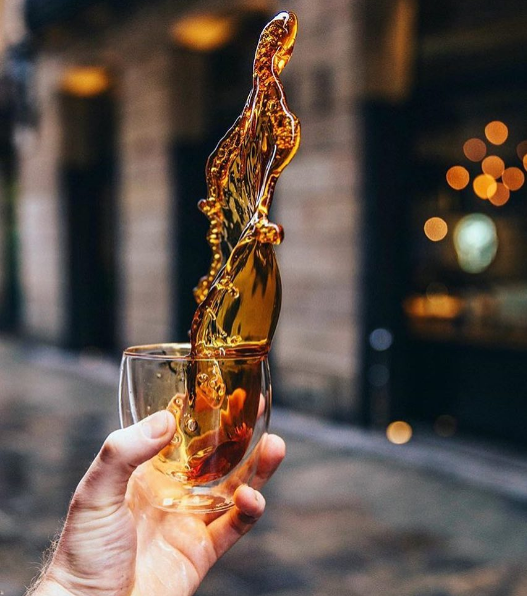How much caffeine should be consumed during exercise?
Follow the caf é (Wechat official account vdailycom) and found that Beautiful Cafe opened a small shop of its own.
The power of caffeine is not just refreshing. New research shows that caffeine can also greatly improve your exercise performance. "We have been studying the effect of caffeine on exercise for many years and have achieved a lot." Dr. Jose Antonio, chief executive of the International Sports Nutrition Association, said caffeine is, in his view, a safe and effective exercise booster.
Dr. Philp J.Prins, a long-time researcher on caffeine and exercise from Grove Urban College in Pennsylvania, said caffeine can boost central nervous activity, which in turn energizes the body, increases alertness and shortens reaction time. Dr. Matthew S. Ganio, a professor at the University of Arkansas, said caffeine prevents muscles from sending pain signals to the brain, reducing muscle soreness and fatigue, allowing you to exercise longer and more. In addition, caffeine can speed up metabolism. "people who consumed caffeine burned more calories at the same amount of exercise than people who did not consume caffeine." University of North Carolina researcher Eric T. Trexler points out.

How much caffeine should be consumed before exercise?
"in order to maximize the effectiveness of exercise, the body should consume caffeine at a ratio of 1.25 to 2.7 mg / lb before exercise." Ganio said. In other words, a 140-pound woman should consume 189-378 milligrams of caffeine before exercise (a cup of home-brewed coffee with an 8-ounce cup contains about 95 milligrams; Starbucks 12 ounces contains 260 milligrams).
If you don't drink coffee regularly, you should start with a minimum of 1.35 mg / lb to avoid dizziness, headaches, tremors or gastrointestinal discomfort caused by excessive caffeine intake, and after your body adapts, increase your caffeine intake to 1.8 mg / lb and finally to 2.7 mg / lb until you feel stronger, faster and more focused.
If you drink 2-3 cups of coffee every day, consuming caffeine before exercise can also improve the effectiveness of exercise. Note, however, that the body may become tolerant to caffeine, and if you feel that drinking coffee is no longer effective, you can choose to stop taking caffeine for 4-7 days, and then you will feel more effective after drinking coffee.
When do you take caffeine before exercise?
Trexler points out that it takes about 15 minutes for caffeine to enter the bloodstream, and the peak effect of caffeine is about 45-60 minutes after intake, which can last 3-6 hours, so he recommends that it is best to take caffeine 30-90 minutes before exercise.
But it's important to note that this is not for night exercise. Although individuals have different levels of sensitivity to caffeine, data from Journalof Clinical magazine show that people who consume caffeine 3-6 hours before bed fall asleep longer and sleep less effectively, so it's best not to drink coffee if you exercise at night.
Your diet also affects the efficacy of caffeine. "simultaneous intake of carbohydrates and caffeine can reduce the effect of caffeine." So try to reduce carbohydrates and eat low-carb foods such as boiled egg, nuts or milk before exercise, Prins said.
Does coffee cause dehydration?
Although caffeine has long been believed to have diuretic properties, Dr. Prins said studies have shown that the amount of sweat and urine after caffeine intake is the same as that of normal people, and PLOS magazine also pointed out that coffee has exactly the same hydrating effect as regular water.
Understand the limitations of caffeine's efficacy
Most studies have focused on the effects of caffeine on endurance sports, such as long-distance running. A study from Grove City College shows that consuming 160 milligrams of caffeine before exercise can improve the performance of 5km runners by 30 seconds. At the same time, there is evidence that caffeine can also improve the effectiveness of endurance sports such as volleyball, tennis and football. However, there is no conclusion about the effect of caffeine on explosive exercise, such as push-ups or weightlifting, but Prins says coffee can effectively relieve muscle soreness no matter which kind of exercise it is.
So coffee is a very healthy drink, it has natural advantages that ordinary drinks do not have, so more and more people feel the unique charm of coffee, and its culture has gradually become a part of public life.
The coffee wharf, which focuses on making a cup of pure freshly ground coffee, has advanced Internet of things technology and high-quality raw material procurement channels, through the unique advantage of zero rent and low labor cost, to bring more people a cup of healthy coffee with good price and high quality. it is slowly affecting the consumption habits of Chinese people and creating a better quality of life.
Important Notice :
前街咖啡 FrontStreet Coffee has moved to new addredd:
FrontStreet Coffee Address: 315,Donghua East Road,GuangZhou
Tel:020 38364473
- Prev

Drinking coffee may reduce the risk of death and prolong life
Following Caf é (official Wechat account vdailycom) found that Beautiful Cafe opened a small shop of its own. Two large studies published in the Chronicle of Internal Medicine on the 10th show that drinking coffee may reduce the risk of death and prolong life. The first study was carried out jointly by researchers from the International Agency for Research on Cancer and Imperial College. They use European Cancer and Camp
- Next

How many cups can you make in a coffee capsule?
Follow the caf é (official Wechat account vdailycom) and found that a coffee capsule can be soaked in a few cups in a beautiful cafe. In general, a capsule of a nespresso coffee machine can be made into a very strong cup or a light or medium flavor according to your taste. It can be made into a small cup of about 25ml, a medium cup concentrate of 40ml and a large cup of 110ml.
Related
- Can I make coffee a second time in an Italian hand-brewed mocha pot? Why can't coffee be brewed several times like tea leaves?
- Hand-brewed coffee flows with a knife and a tornado. How to brew it? What is the proportion of grinding water and water temperature divided into?
- What is the difference between Indonesian Sumatra Mantinin coffee and gold Mantinin? How to distinguish between real and fake golden Mantelin coffee?
- What does bypass mean in coffee? Why can hand-brewed coffee and water make it better?
- Unexpected! Ruixing Telunsu lattes use a smoothie machine to foam milk?!
- % Arabia's first store in Henan opens into the village?! Netizen: Thought it was P's
- Does an authentic standard mocha coffee recipe use chocolate sauce or powder? Mocha Latte/Dirty Coffee/Salty Mocha Coffee Recipe Share!
- What is the difference between Vietnam egg coffee and Norway egg coffee? Hand-brewed single product coffee filter paper filter cloth filter flat solution!
- What is the difference between sun-cured and honey-treated coffee? What are the differences in the flavor characteristics of sun-honey coffee?
- How to make Italian latte! How much milk does a standard latte use/what should the ratio of coffee to milk be?

